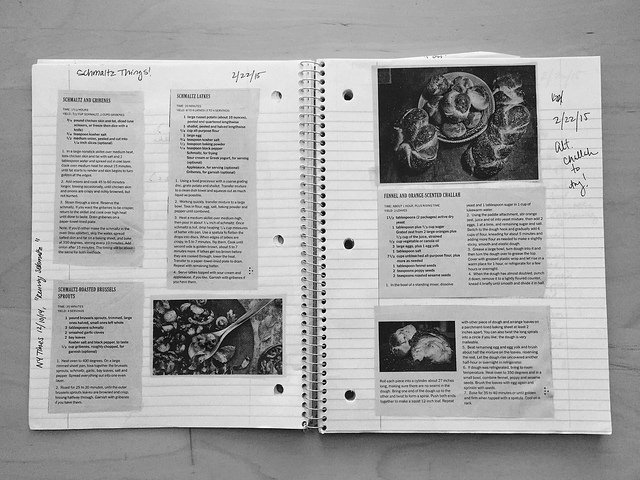Keeping a cooking journal is a small but effective technique for improving your cooking practice. I’ve only started doing in the past year, but since I started I’ve found myself wishing I had begun years ago. It’s something I highly suggest that other home chefs do too because it can have a big positive impact on the learning process.
Why a Cooking Journal is Important
A cooking journal is simply a place for you to take notes about your cooking projects. And just like in school, the notes you take about cooking help you process and retain a lot more information than you would otherwise. As you cook more frequently, you likely find yourself pulling recipes from many different sources. You’ll probably mix together elements of different recipes to make your own version. You might even strike out and play with original concoctions. And when you do make that perfect pancake, or discover your new twist on an old childhood favorite, you’ll want to make sure that you can replicate it. Taking notes on where you find your inspiration, how you tweak recipes and what you liked (or disliked) about a dish helps ensure that good cooking isn’t a lucky chance, but a measured process that you can recreate next time. Keeping a cooking journal will save you time and energy down the line by helping to focus your cooking process and make you more conscious of past successes and failures.
How to Use a Cooking Journal
Get a cheap spiral notebook and leave it in your kitchen, or use an app like Evernote if you want to keep things digital. Don’t worry too much about using something too fancy or complicated; function is much more important than form in this case. If you’re using a paper notebook, it’s likely that at some point it’ll end up with a dusting of flour or a few rogue drops of olive oil on the cover, anyway.

Write down what you cook– everything you cook. If possible, jot down notes as you go, or soon after you’re finished and your memory is fresh.
If you’re the organized type, it can be helpful to provide a bit of structure to your journal. If you’re using a notetaking app you might want to sort it into folders for different categories of dishes (meat, desserts, veggies, etc). If you’re using a hardcopy journal you can use Post-it notes to color code important pages.
What Do I Include in my Journal?
Just like a regular journal, you can put whatever you want into a cooking journal. If you want to draw diagrams of how to chop an onion, compose odes to the perfect cheeseburger, or write down the precise temperature and weight of every ingredient you use, you can. Sometimes I’ll even cut out and tape in recipes I find in magazines or the newspaper and want to try. Other times I’ll just write a few notes about ideas for different flavor combos for my next batch of cupcakes.
The key thing to remember is that the purpose of the journal is to help you improve in the future, so try to include notes that will help you the next time you make a dish. When you’re experimenting with a new mix of spices, keep track of what you’re putting in the mix so you can replicate or improve it the next time around. When you’re trying a new technique, write down what you did, where you messed up, and how you can do it better.
The Secret to Good Journaling: Going Back!
The most important part of keeping a cooking journal is going back and reviewing what you’ve written. When you’re preparing to make a dish that you’ve already made before, refer to the notes you took the first time. Try to improve your process slightly (or significantly). Going back and making recipes again is a critical part of improving your skills, and having notes from the last time you made something is a great way to jump start your efforts.
It’s also fun to take time, every once in a while, to go back and flip through the early pages of your cooking journal. Looking back can help you realize how far you come, and help motivate you to be even more adventurous in the future. Happy journaling!



